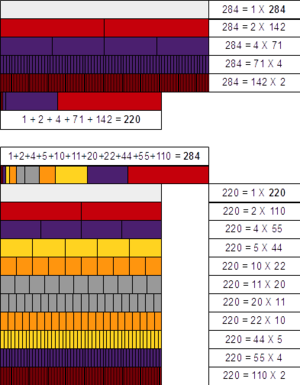Amicable Numbers
Amicable Numbers is an independent research project that uses BOINC based volunteer computing and needs your help to find new amicable pairs.

Why Amicable Numbers?[edit | edit source]
Collecting data on all amicable numbers up to a very large limit will facilitate theoretical research in several fields: 1, 2, 3 to name a few examples.
Data from this project will also help to improve understanding of the properties of Divisor function.
Goal[edit | edit source]
The current goal of Amicable Numbers is to find all amicable pairs with smallest member < 1021.
Methods[edit | edit source]
BOINC is used because it is the only viable way for this independent project to obtain computational power at this scale.
Terminology
N - the limit for the search. The algorithm must find all amicable pairs with smaller member m ≤ N
m - smaller number in a pair
n - larger number in a pair, or an arbitrary natural number when used in enumerations (i.e. p1, ..., pn)
σ(m) - sum of all divisors of m, including 1 and m.
The following basic algorithm can be derived from the very definition of amicable pairs:
- Iterate over all numbers between 1 and N
- For each number m, calculate n=σ(m)-m
- If n > m, then calculate σ(n)
- If σ(n) = σ(m), then (m, n) - amicable pair
This is very inefficient because it requires one and in many cases two full factorizations per iteration, so improvements were devised.[1]
1. Avoiding factorization of m
2. Trimming down factorization of n
3. Reducing search space
As a result of these improvements, this projects algorithm - download the source code: Amicable.zip - finds all amicable pairs < 1013 in just ~24 minutes on Core i7-4770K (8 parallel threads). The asymptotic complexity of the algorithm seems to be O(N×log(log(N))) and there is no strict proof, but run times for N=1010...1017 align almost perfectly with C×N×log(log(N)).
The latest source code is also available on GitHub: https://github.com/SChernykh/Amicable
Project team / Sponsors[edit | edit source]
Sergei Chernykh
Scientific results[edit | edit source]
New data from this project is published regularly on the Amicable pairs list page.